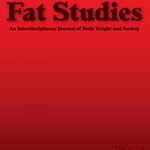 Fat Studies: An Interdisciplinary Journal of Body Weight and Society, guest edited by Abby Gondek (Web)
Fat Studies: An Interdisciplinary Journal of Body Weight and Society, guest edited by Abby Gondek (Web)
Proposals by: 31.07.2020
This special issue will focus on historical, ethnographic and auto-ethnographic approaches to the intersections of Jewishness, race and fatness. Historically, representations of Jews and Jewishness have focused on the supposed „abnormality“ of the Jewish body and sexuality. Often, studies of Jews, race and the body focused on Jewish men, but this special issue will center female-identified, trans, or gender non-conforming bodies. Though there is much scholarship on Jews and the body and the racialization of the Jewish body, there are fewer examinations of how representations of fatness are tied to these narratives about the „abnormal“ Jewish body and sexuality. Also, fatness typically is seen as a negative attribute and is rarely reclaimed. For this reason, this special issue will take a Fat-Affirmative and Health at Every Size approach to this topic. Please note that fatness must be a central theme of your submission.
This special issue invites papers that address the concept of Jews, Race and Fatness focusing on gender and sexuality and using historical, ethnographic and auto-ethnographic approaches. Experimental or creative manuscripts that blend auto-ethnography with ethnography and history are encouraged. In addition, submissions from and about the Global South are highly recommended. Potential topics might include one or more of the following:
- What are specific historical cases in which narratives about Jewishness, race and fatness have predominated?
- What are the racialized experiences (from an ethnographic or auto-ethnographic perspective) of Jews who are fat and identify as female, trans or gender non-conforming?
- How do Jews of color experience the assumed connection between Jews and fatness?
- How and why are representations of Jewishness tied to images of fatness, race and sexuality?
- What are the connections between Jewish performers and performance (including artists, dancers, comedians, actors) and fatness, race, the body and sexuality? (both historically and into the present)
- How do (did) white Jews and Jews of color and non-Jews of color relate to and interact with each other in relation to the intersections of fatness, Jewishness, race, and sexuality?
- How did Jewishness, race and fatness intersect during the Holocaust period?
- How do conceptions of fatness, race and Jewishness impact families, and especially relationships between parents (or guardians) and their children? (both historically and into the present)
- How are the intersections of Jewishness, race and fatness different in divergent national and regional locations? (for example, comparisons across the Global South- Africa versus Latin America)
Fat Studies always puts the terms „obese,“ „overweight,“ „underweight,“ „normal weight,“ „the obesity epidemic,“ etc. into quotation marks. It prefers use of the terms fat, thin, average weight, fatness, etc. that are not in quotation marks. Abstracts and articles that focus on diseases related to higher weights or that recommend weight loss or dieting will not be accepted.
Fat Studies is the first academic journal in the field of scholarship that critically examines theory, research, practices, and programs related to body weight and appearance. Content includes original research and overviews exploring the intersection of gender, race/ethnicity, sexuality, age, ability, and socioeconomic status. Articles critically examine representations of fat in health and medical sciences, the Health at Every Size model, the pharmaceutical industry, psychology, sociology, cultural studies, legal issues, literature, pedagogy, art, theater, popular culture, media studies, and activism.
Fat Studies is an interdisciplinary, international field of scholarship that critically examines societal attitudes and practices about body weight and appearance. Fat Studies advocates equality for all people regardless of body size. It explores the way fat people are oppressed, the reasons why, who benefits from that oppression and how to liberate fat people from oppression. Fat Studies seeks to challenge and remove the negative associations that society has about fat and the fat body. It regards weight, like height, as a human characteristic that varies widely across any population. Fat Studies is similar to academic disciplines that focus on race, ethnicity, gender, or age.
Submit to Abby Gondek: abbygondek@outlook.com
Source: H-Net Notifications
